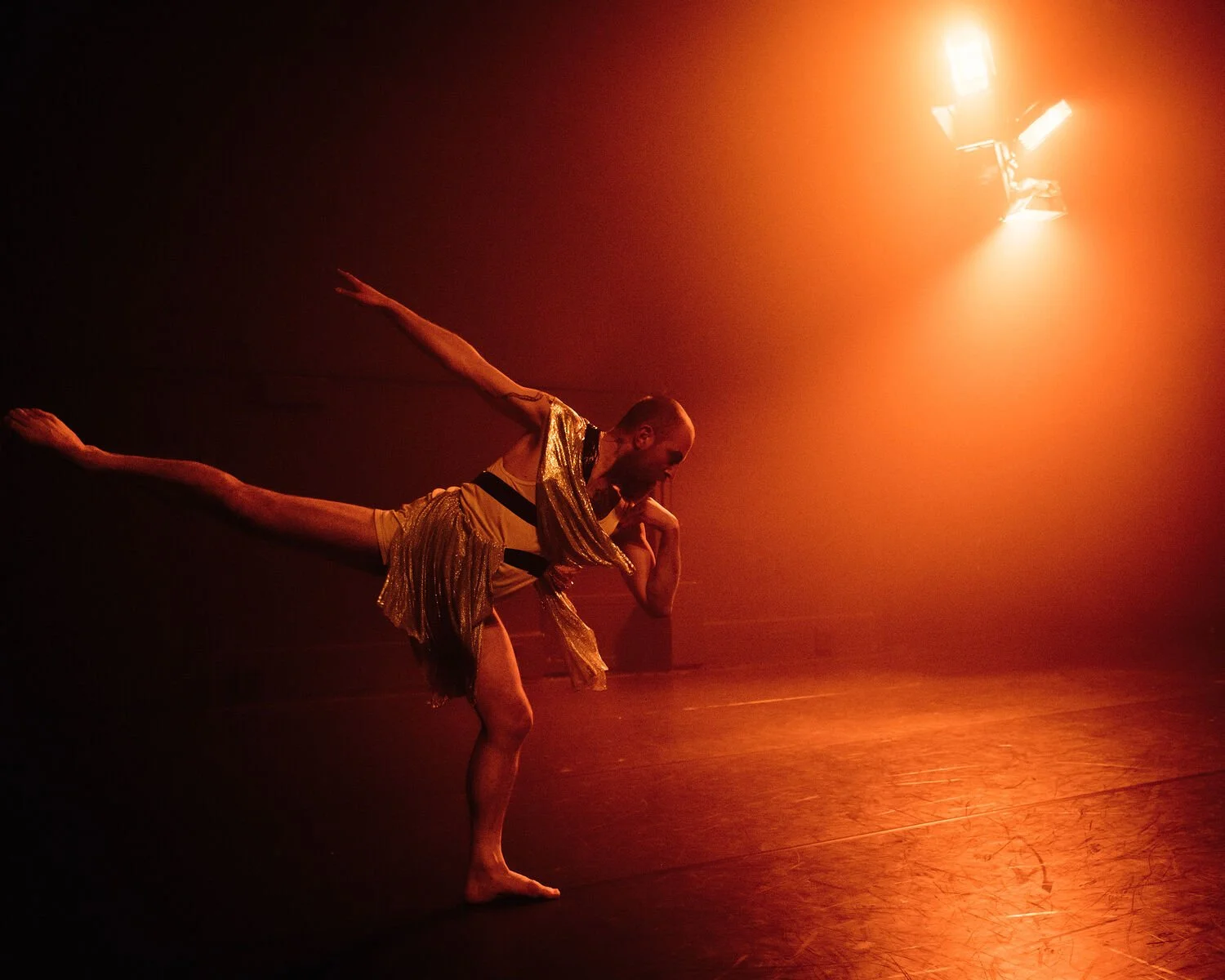MAISON OUVERTE #8
Pairing a performance with a lecture, this programme addresses how dance and choreography can respond to times of crisis.
Price: Completely free of charge thanks to the support of Malmö stad, Region Skåne and Kulturrådet
PROGRAMME
At Festsalen — Ungdomens Hus, Norra Skolgatan 10 B, Malmö
18.30 – 19.00 · Mingle & Buffet
Mingle and enjoy our buffet in the foyer.
19.00 – 20.15 · Tribute to Kurt Jooss' Green Table – performance by Frédéric Gies & Manuel Pelmuș //// Truth, Protest and Some: Dance and War 1920 to Today – lecture by Josefine Wikström
By looking back at historical materials and reflecting on current times and by pairing a performance by Manuel Pelmus and Frédéric Gies with a lecture by Josefine Wikström, this programme addresses how dance and choreography can respond to times of crisis and war.
Tribute to Kurt Jooss’ Green Table
Performance by Frédéric Gies and Manuel Pelmuș
Manuel Pelmuș and Frédéric present Tribute to Kurt Jooss’ Green Table, premiering at Steirischer Herbst for the opening of the 2025 edition of the festival and coming now at Maison de la Danse. They revisit Kurt Jooss’ groundbreaking anti-war ballet The Green Table (1932), which addresses the futility of diplomacy in the face of war and fascism. Their homage—performed solo by Gies, echoing Jooss’ original concept—enters into a critical dialogue with the piece, engaging with its choreographic vocabulary and political urgency. The tradition of the Danse Macabre, central to the original work, remains a key element in this contemporary reimagining. The performance reflects on today’s fractured global order, in which peace negotiations often serve more to simulate control than to find real solutions.
Concept, choroegraphy: Frédéric Gies and Manuel Pelmuș
Dance: Frédéric Gies
Music: Fiedel
Costumes: Grzegorz Matlag
Lighting design: Thomas Zamolo
Commissioned and produced by steirischer herbst ’25
With the kind support of ERSTE Stiftung and Office for Contemporary Art Norway (OCA)
Truth, protest and Soma: Dance and War 1920 to today
Lecture by Josefine Wikström
If wars in the early to mid-20th century were characterised by a clear beginning and end, the idea of war as something permanent and unending has dominated since the early 21st century. Moreover, these long-lasting and permanent wars are difficult to distinguish from other major global crises, such as the pandemic, the climate crisis and the crisis of democracy. How have dancers and choreographers responded to war, from the beginnings of modern dance in the early 1920s until today? How can the different ideas of war that have been present in the 20th and 21st centuries be reflected in modern and contemporary dance works? What is dance's role or task in times of war today?
20.15 – 21.00 · After Talk (with Manuel Pelmuș, Frédéric Gies & Josefine Wikström)
A conversation with artists Manuel Pelmuș, Josefine Wikström and Dance is Ancient’s Artistic Director, Frédéric Gies.
JOSEFINE WIKSTRÖM
Josefine Wikström is a writer, critic and researcher living in Gothenburg. Her research focuses on dance and performance in contemporary art from historical materialist and art philosophical perspectives. She is the author of the book Practices of Relations in Task-Dance and the Event-Score: A Critique of performance (2021), Objects of Feminism (2017 together with Maija Timonen); Critique of the Freedom of Art (2022 together with Gustav Strandberg and Kim West) and Autonomins Sken: Om Kalliasbreven och frågan om estetikens politik hos Friedrich Schiller (2024 together with Gustav Strandberg and Kim West). She works as a senior lecturer in the theory and practice of contemporary performative arts at the Academy of Music and Drama, at Gothenburg University. She is a dance critic for Dagens Nyheter and serves as one of the editors of the experimental philosophy- and art- platform SITE Zones. She is currently working on a book on the social form of contemporary dance and its relationship to critique.
MANUEL PELMUS
Manuel Pelmuș (born in Bucharest, works in Oslo) has a background in choreography and dance and is interested in ideas of living presence in exhibition contexts and explores the relationship between the human body, memory and the construction of history. He was awarded the Berlin Art Prize in 2012 for performing arts, and represented Romania at the 55th Venice Biennale in 2013 together with Alexandra Pirici. His works have been shown in numerous international museums and biennials, such as Palais de Tokyo (FR), MUNCH (DE), Tate Modern (UK), Centre Pompidou (FR), Para Site Hong Kong (HK), Kunsthalle Vienna (AT), Kiev Biennale (UA), Van Abbemuseum (NL), etc. He is currently vice rector for artistic research at the National Academy of the Arts Oslo.
Frédéric Gies. Photo: Thomas Zamolo.

